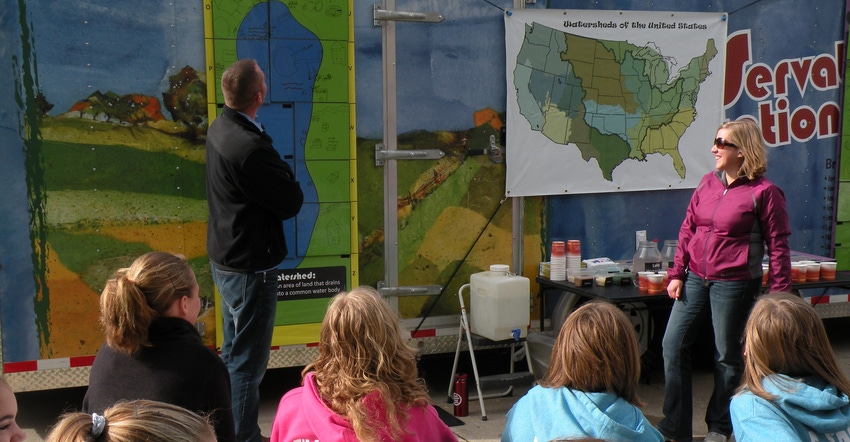March 29, 2022

Water Rocks! is well-respected and has been recognized by conservation outreach experts and educators throughout Iowa for its impact on young people in and out of schools. Sprouting from a need to make water quality and conservation education more accessible and relevant to a new generation, Water Rocks grew out of the Iowa Learning Farms program at Iowa State University Extension and Outreach and quickly became a successful outreach program in high demand for public events and school visits. Founded in 2012, this unique and award-winning youth education program is celebrating its first decade, and the future looks bright.
Formation of Water Rocks
There are several perspectives on how and why Water Rocks became a reality. Allen Bonini, retired Iowa Department of Natural Resources watershed improvement supervisor, recalled the origins as filling a need to encourage generational change in how water quality and pollution were perceived. Having spent years early in his career working on recycling program education, he recognized the influence young people have on adults around them, and that as they matured, the values were carried with them.
“I was a member of the ILF steering committee, and we felt that focused youth outreach was outside the purview of the organization,” Bonini says. “ILF had spent much of its effort on retraining active farmers in Iowa to be more attuned to conservation issues and practices, but as those farmers aged and retired, the commitment tended to retire with them — no legacy was established and handed down. Water Rocks seemed like a great way to build in change from the ground up.”
Jacqueline Comito, Water Rocks executive director, was there at the beginning as well. As part of the creative team, she amplified Bonini’s perspective that youth are the key to promoting substantial change, and she understood that hooking young learners early and delivering science-based information in fun and memorable ways was crucial to success.
“We understood the power of music and art as educational tools, and built them into the programming from the beginning,” Comito says. “Our approach may have been unorthodox in terms of traditional Extension outreach, but incorporating movement and hands-on activities with fun and inventive music has proven to make a difference with students and teachers. Delivering fun programs has been effective, but the real secret to our success has always been never resting on our laurels — always evaluating and tuning programs to deliver the best outcomes.”
Humble beginnings
Looking at the hundreds of videos, songs, games and activities in the Water Rocks portfolio today, it can be hard to imagine that the program truly started with a blank slate. The eager team understood what information they wanted to teach, but were certainly not experts in the elementary or secondary classroom. Partnering and communicating with teachers in classrooms and school they visited, Water Rocks hit on a winning formula.
“Having the advantage of being the fun program that comes from outside the classroom certainly gets the students’ attention, but unless we are amplifying and reinforcing what the teachers are teaching, we aren’t doing our job,” Comito says. “We’ve had great fortune in working with teachers throughout the state who have given us candid feedback on what worked, and frankly, what has fallen flat — and we are grateful to hear it all.”
The program started small with a lot of testing, revision and workshopping to find what connected with the youth audience and what did not. Looking to create a fun hands-on theme for watersheds, the team came up with an idea for environmental puzzle pieces that students could draw on. “The first classroom visits with this and other activities were so fun and exciting — seeing the faces light up with comprehension and delight was proof that we were on the right track,” Comito says.
“From Day 1, we’ve woven evaluation and introspection, testing and revision into everything we do,” Comito says. “We listen to feedback from students, teachers, peers and the public to help ensure the underlying science is being communicated, the students are learning the key pieces and the lessons align with teacher needs. This process not only constantly improves the quality of Water Rocks programs, it also helps us stay relevant to a rapidly changing environment and society.”
The secret to success
Matthew Helmers, director of the Iowa Nutrient Research Center and ILF faculty adviser, has watched Water Rocks grow and be sustained across the years. He noted that Extension programs of this nature seldom last for 10 years.
“The Water Rocks team applies a unique successful method to meeting the needs of our state in educating youth about critical topics that will impact their lives and livelihoods in the future,” Helmers says. “At its core, Water Rocks stands on solid, scientific understanding, but then weaves in things that engage a broader audience and draws them in with a memorable experience and lesson. However, the key to the program’s longevity is the constant evolution of programs to stay current, better and unique, so they continue to engage audiences.”
Bonini also applauds the Water Rocks team and its creative and caring approach to conservation education. “I am awed by the talent of the team, and it seems to be getting bigger and better all the time. I look at my involvement with Water Rocks as one of my career highlights, and am so proud to have been a part of it. Ten years! Wow!”
“Water Rocks started out, and continues to be, an evolving search for the best way to engage youth to help them care about their world,” Comito concludes. “We’ve accomplished a lot by leading with our hearts and love of the environment, and are committed to continuing to deliver an indispensable tool for youth education in Iowa.”
Staudt is director of Water Rocks and a conservation outreach specialist with Iowa Learning Farms.
You May Also Like




